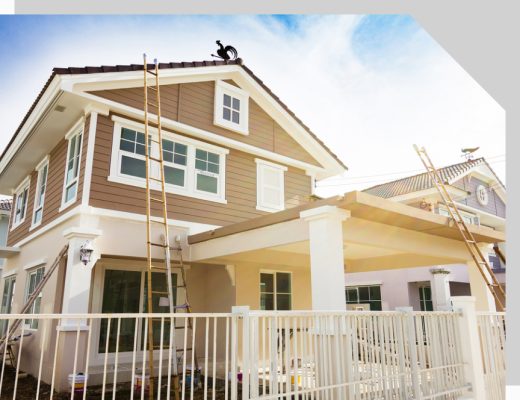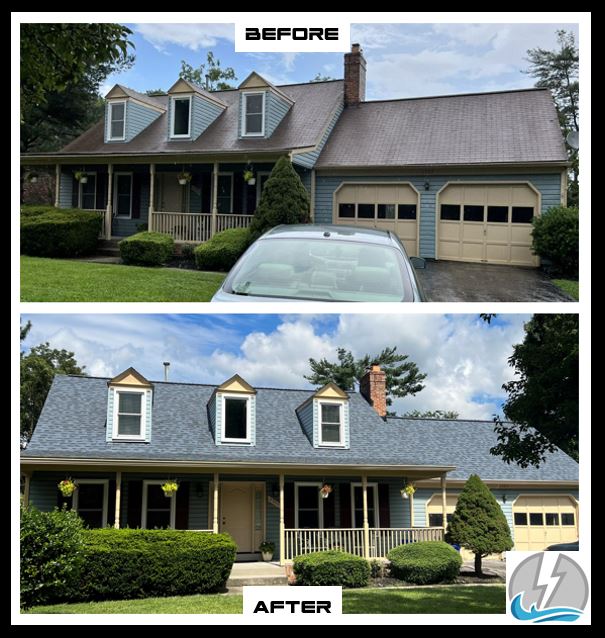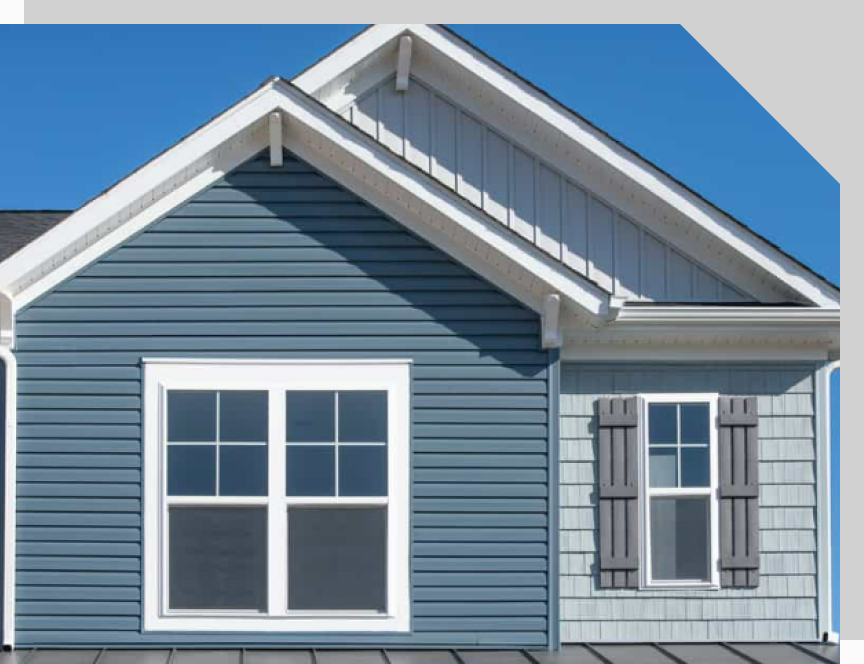Exterior Siding Options at Thunder Bay Roofing
Are you looking to update your home with new, durable exterior siding? Thunder Bay Roofing remains a trusted name. Led by experienced Maryland siding contractors, our team is dedicated to providing quality siding material for today’s homeowners. We’re not simply installing new siding here; we’re fortifying your home with a proven shield of durability and resilience.
Ready to learn more about our siding services and what type of siding is best for your project? Contact our Edgewater siding company at 410-956-7663 for a no-obligation consultation. From asphalt siding to fiber cement siding to insulated siding, there are many options to consider. Thunder Bay Roofing does not offer asphalt siding.

The Thunder Bay Roofing Siding Experience
Choosing Thunder Bay Roofing for your siding project means selecting a team that combines traditional craftsmanship with modern expertise:
- Personalized Assessment: We start by evaluating your home’s needs and your aesthetic preferences.
- Tailored Recommendations: Our experts will guide you through our siding options to help you find the perfect fit.
- Meticulous Installation: Our skilled technicians ensure every shingle is installed with precision and care.
- Comprehensive Warranty: We back our work with strong warranty options, giving you peace of mind for years to come.
What Is Asphalt Siding?
Asphalt siding is a robust exterior cladding material designed to protect and beautify buildings. Composed of a mixture of asphalt, mineral granules, and a wood-fiber-based backer board, this siding material is renowned for its durability and longevity. The low maintenance requirements of asphalt-based building siding make it an attractive option for both residential and commercial construction projects.
Types of Asphalt Siding
Asphalt siding comes in various forms, each offering unique benefits and installation methods. Asphalt siding shares characteristics with asphalt roof shingles, including the composition of colored mineral granules bonded to an organic base. Some of the types of asphalt siding include:
- Asphalt Shingle Siding: This type of asphalt siding product features individual shingles installed in an overlapping pattern, providing a classic look and enhanced protection.
- Asphalt Sheet Siding: Made from large sheets of asphalt material, this particular asphalt siding product is installed in single pieces, offering a seamless and uniform appearance.
- Asphalt Panel Siding: For this type of asphalt building siding, pre-fabricated panels are installed in a modular pattern, making installation quicker and providing a modern aesthetic.

Benefits of Asphalt Siding
Choosing asphalt siding is not only a nod to tradition but also a strategic decision for your home’s future. Benefits of asphalt siding include:
- Durability: Asphalt siding has been protecting homes for decades, standing up to harsh weather and aging gracefully. Similarly, asphalt shingles are known for their durability and cost-effectiveness.
- Fire Resistance: With built-in fire-resistant properties, this siding offers an extra layer of safety for your home.
- Cost-Effective: Providing robust protection at a competitive price, this siding offers excellent value for your investment.
- Noise Reduction: The dense nature of this siding helps dampen external noise, creating a quieter home environment.
- Low Maintenance Longevity: A simple cleaning regimen keeps this siding looking fresh, so you can enjoy its benefits without frequent upkeep.
Downsides of Asphalt Siding Product
Health Concerns: Asbestos or Hazardous Material
- Old asphalt building siding products (pre-1980s) may contain a known carcinogen called asbestos
- Due to the possible presence of asbestos in certain asphalt siding materials, expert inspection is crucial to safely determine the age and type of the products
- Removal or renovation of old asphalt building siding poses serious health risks due to the presence of hazardous materials
- Appropriate dust control measures are costly
Performance Limitations
- Less durable compared to modern alternatives like vinyl, fiber cement, or engineered wood
- Prone to cracking, warping, and color fading when exposed to harsh weather and UV radiation
- Provides minimal insulation value, resulting in poor energy efficiency
Maintenance Issues
- Tendency to absorb moisture, leading to mold and mildew growth
- Difficult to repair without leaving visible patches
- Often requires the replacement of entire sections when damaged
Obsolescence
- Availability of more advanced, low-maintenance siding options
- Modern alternatives offer better durability, energy efficiency, and aesthetic versatility
- Negative perception due to past asbestos use and performance issues
Asphalt Siding vs. Other Options
Asphalt Siding
- Pros: Durable, weather-resistant, and versatile in appearance. It can mimic materials like brick and stone, offering aesthetic flexibility. Asphalt siding is also relatively cost-effective.
- Cons: Prone to damage from extreme weather and may require more maintenance. Older products may contain asbestos, posing health risks. It provides minimal insulation value, affecting energy efficiency.
Vinyl Siding
- Pros: Highly durable, low maintenance, and resistant to weathering. Vinyl siding is available in a wide range of colors and styles, making it a popular choice for modern homes. It also offers better insulation properties compared to asphalt siding.
- Cons: Can be more expensive upfront. While durable, it can crack or warp under extreme temperatures.
Asbestos Cement Siding
- Pros: Cement asbestos siding is extremely durable and fire-resistant. It requires minimal maintenance and offers excellent longevity.
- Cons: Health risks associated with asbestos fibers. Removal and disposal can be costly and require professional handling. It’s also heavier and more challenging to install compared to other materials.

Environmental Impact of Asphalt Siding
Asphalt siding’s environmental impact involves several key considerations. The production process is petroleum-based, relying on crude oil refining, a non-renewable resource. This energy-intensive manufacturing emits volatile organic compounds (VOCs) and greenhouse gases, contributing to pollution. However, asphalt siding boasts a long lifespan of 20-30 years, which reduces the frequency of replacement and minimizes waste from damaged materials.
When it comes to end-of-life considerations, some asphalt siding can be recycled into road construction materials, helping to mitigate waste. Yet, non-recycled asphalt contributes to landfill waste, and over time, chemicals may leach into soil and groundwater. While asphalt siding offers insulation properties that can reduce home energy consumption, it is generally less efficient than modern alternatives.
Maintenance Details for Asphalt Siding
- Regular Cleaning: Start by cleaning the siding at least once a year to remove dirt, algae, and mildew. Use a mixture of household cleaner and water. Apply this solution with a pump sprayer or a soft brush on an extension pole. Avoid using a power washer, as it can damage the siding by forcing water behind it.
- Scrubbing and Rinsing: After applying the cleaning solution, scrub the siding gently with a brush to remove any buildup. Rinse the area thoroughly with clean water from a garden hose to ensure all cleaning agents are washed away.
- Inspect for Damage: After cleaning, inspect the siding for any signs of damage, such as cracks or loose shingles. Address any issues promptly to prevent further deterioration.
- Sealant Application: Consider applying a clear sealant or wood stain to inhibit mold and mildew growth. This step is particularly beneficial if your siding is exposed to moisture or shaded areas that promote fungal growth.
- Debris Removal: Regularly check for and remove debris such as leaves and branches that can accumulate on the siding. This helps prevent moisture retention and potential mold growth.
- Gutter Maintenance: Ensure that gutters are cleaned and functioning properly to direct water away from the siding. Clogged gutters can lead to water overflow, which may damage the siding over time.
- Trim Vegetation: Keep trees and shrubs trimmed back from the siding to reduce moisture retention and limit exposure to pests that could cause damage.
- Monitor for Stains: If you notice staining on your asphalt siding, it may be due to fungus or algae. Use a solution of bleach and water to treat these stains, applying it carefully with a brush and rinsing thoroughly afterward.
Applications of Asphalt Siding
Asphalt siding is a versatile building material suitable for a wide range of applications.
- Residential Construction: Its durability and low maintenance make it a popular choice for homes, providing long-lasting protection and aesthetic appeal.
- Commercial Construction: Ideal for buildings in harsh weather conditions, asphalt siding offers reliable performance and minimal upkeep.
- Roofing: In addition to siding, asphalt can be used for roofing, particularly on steep slopes, offering a cohesive look and added protection. Asphalt roofing shares many characteristics with asphalt siding, including durability and weather resistance.
Regulatory Information Related to Asphalt Siding
Building Codes
The International Residential Code (IRC) sets standards for siding materials, including wind resistance and fire safety. Local building codes may impose additional requirements or restrictions, such as specific energy efficiency ratings for exterior cladding.
Asbestos Regulations
The EPA’s Asbestos Ban and Phase Out Rule, enacted in 1989, banned new uses of asbestos but allowed continued use in existing products. Asphalt siding produced before the 1980s may contain asbestos. OSHA has established strict guidelines for handling and removing asbestos-containing materials, requiring proper training and protective equipment for workers.
Environmental Regulations
Some states limit VOC content in siding materials, which manufacturers must adhere to during production. Energy codes in certain regions may require asphalt siding to meet specific R-value standards.
Installation and Contractor Regulations
Many states mandate specific licensing for siding contractors to ensure qualified installation. Improper installation can void manufacturer warranties; installers must follow specific guidelines to maintain warranty coverage.
Disposal Regulations
Old asphalt siding with asbestos may be classified as hazardous waste, necessitating special handling and disposal procedures. Some areas have recycling programs for asphalt siding materials, impacting disposal costs and methods.
Additional Considerations
Homeowners should verify local regulations before installation to ensure compliance. Regular inspections may be required to ensure ongoing adherence to safety standards. Awareness of potential environmental impacts can guide sustainable choices in siding materials.
By considering these regulatory requirements, homeowners and contractors can make informed decisions regarding the use of asphalt siding while ensuring compliance with relevant laws and standards.

Frequently Asked Questions
With proper installation and maintenance, asphalt siding can protect your home for 20 to 30 years or more, offering a long-term solution for your property. However, it’s important to note that older asphalt siding products may contain asbestos fibers, necessitating competent inspections to verify the materials in question.
Asphalt siding material is known for its resilience in harsh conditions, including high winds, heavy rain, and even hail. Its flexibility allows it to absorb impact without cracking, providing consistent protection.
